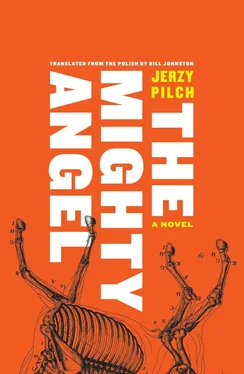Simon Pure Goodness looks around at the countenances of his comrades in arms gathered in the lecture theater and he sees how after a week, or three weeks, or a month, those countenances have become less puffy and more refined, while noses lose their redness and eyes acquire a twinkle. The Hero of Socialist Labor has changed beyond recognition. Just recently his head was still as tumid as a neon light, his tufts of gray hair in disorder, his clothing awry, his hands atremble. And now how does he look? A slim, tan masculine face, a mane of hair, a smart red-and-black checked flannel shirt, hands firmly and precisely gripping a cup of ersatz coffee. The Hero of Socialist Labor now looks like Clint Eastwood’s older brother.
The alcos recover their sight, their hearing, and their speech. The Most Wanted Terrorist in the World, par exemple . I don’t know if I mentioned this, but an additional obstacle in writing down the Terrorist’s chaotic stories was the fact that he spoke in a hoarse inaudible whisper. It was the famous voice of the actor Jan Himilsbach at the point where it had almost completely disappeared, the vocal chords reduced to ashes. And now? A few weeks later? Now the Most Wanted Terrorist in the World not only speaks in such a way that he can be understood, now the Most Wanted Terrorist in the World speaks in such a way that immortalizing his speech is a task of the first importance. He stops me in the hallway and whispers confidentially in my ear:
“Don’t worry, Jerzy, don’t worry, they’ll find a medicine to cure our illness. I mean, they found something for Johnson’s.”
“If the graduates of this academy can go from apathetic muteness to the lucid production of such memorable turns of phrase in the space of a few short weeks,” whispers Christopher Columbus the Explorer to himself in rapturous admiration, “if that’s the case, then from now on, in the box marked Education on forms, I’m going to write that I have two degrees: one in philosophy and one in alcohology.”
Or the Sugar King. I’ve not written much about him because I don’t much like him. But he too has one affecting characteristic: he’s sensitive to the beauty of nature and the fate of stray animals. The entire army of alcos is almost without exception sensitive to the beauty of nature and the fate of stray animals. At dusk, wandering shades can be seen in the fields — the alcos are picking wild flowers. Legs afflicted with polyneuropathy carry them across the steaming meadows between the dormitories of the insane. The luxuriant bouquets decorate nightstands; the scent of cornflowers, camomile, and mimosa fills the ward like tear gas. They sleep, stifled by the smell and by their own weeping. In the dormitories of the insane, orange lights burn all night long; caterwauling can be heard at the foot of the walls. The innumerable cats have it good at this infirmary for paranoids. It’s impossible to look out of a barred or unbarred window and not see a band of felines crossing from one wing to another or moving from the forensic building to the neurology ward. There are more cats here than alcos, schizos, and suicides put together. And in the depths of the Sugar King’s unfeeling soul there is a great love of cats. Every evening the Sugar King wraps the paltry remains of his hospital dinner in a torn-out page from Gazeta Wyborcza and sneaks off to the day ward. From the opposite direction, from behind the brick wall, he’s met by an almost completely black cat by the name of Sky Pilot — he’s almost completely black, but round his neck he has a white mark that really does look like a dog collar. As to whether Sky Pilot and the Sugar King are dear friends, the answer is unclear. It’s unclear because for the sake of the Sugar King it does not wish to be in the negative.
Sky Pilot eats the leftover cold frankfurters or plain sausage; he sniffs unenthusiastically at an undercooked piece of chicken and for a moment, as if out of distraction, he lets the Sugar King pick him up. From behind the dingy windows of the neurology ward the patients, motionless as cadavers, watch a thickset man in an emerald-green track suit stroking and cuddling a cat; he presses his face to the dark fur and cries, tears running down the animal’s pitch-black coat. The Sugar King has been reminded of sorry things — a life wasted, parties long over, women lost. When did the Sugar King last pick up a cat? During the occupation? Under Stalinism? Not any later than that, for sure.
The ritual scene of feeding and weeping repeats every evening. But for a few days now it has not repeated. Sky Pilot has disappeared; he failed to come out from behind the brick wall at the established time. The Sugar King has walked the entire area, round all the wings; he even went through the dark woods down to the Utrata. Sky Pilot is nowhere to be found.
We’re not brave enough to openly poke fun at the Sugar King’s childlike despair; we merely cast hypocritically commiserative glances in his direction, while he glares at us through eyes that are as dead as pebbles in the Utrata and shouts:
“What do you expect of a cat? Why would a cat look at a person when it’s got cat-whores on every side? Cats aren’t able to jerk off, and you can’t argue with that!”
I’m not fond of the Sugar King, but I admit the difference between him and me is not so great. The difference between me and Simon Pure Goodness, on the other hand, is fundamental. Simon is escaping.
From the point of view of the further drinking of Żołądkowa Gorzka you can’t argue with it. If Simon had graduated in alcohology, if he’d diligently attended the lectures and the seminars, if he’d conscientiously kept his emotional journal and written all his confessions and assignments, if he had persevered — then it would have been much harder for him to drink than it will be after he escapes. After an escape from the Department of Alcohology it’s not only easier to drink, after an escape drinking is a higher imperative — and after all, why does one escape? Because of a higher imperative.
To graduate in alcohology and then keep on drinking is something of a faux pas. What will people say? They’ll say so-and-so, he studied alcohology and then when he graduated he kept on drinking, he’s a corpse now. Though people are one thing, people often saw me as a stinking corpse and I the corpse remained alive, and the people remained alive too. People are one thing, but what would the specters say, the ones I’ve been summoning for years through the drinking of successive bottles of Żołądkowa Gorzka? What would they say as they crowd around me? What would the green-winged angel with the build of a wrestler say? What would my grandfather Old Kubica say? What would my alleged Sunday School pal say, the one who smelled of cheap cologne?
I felt waves of hot and cold washing over me; I rested my forehead against the frost-covered window pane and saw cankerous innards pulsating beneath skin that was covered with piglike stubble.
“Get your things together and run away, run away as fast as you can.” His voice was remarkably similar to that of the alleged Józef Cieślar — the same good-natured tone of a G.P. on a house visit, a slightly different, shriller coloration, but good-natured nevertheless. I listened to him and did not feel the cold.
“Get your things together, run away; at any moment you can go wherever the mood takes you.”
“I’m staying here. Simon Pure Goodness is running away.”
“Fine, just fine”—I believe he gave a convulsive giggle—“I’m staying, he’s leaving. You’re talking like a member of the Politburo, that’s the first comparison that comes to mind. ‘Comrade, our cause is lost. You have to leave; I’m staying.’”
“Not a word about the former regime. The former regime makes me want to puke, and so do comments about the former regime.”
Читать дальше












